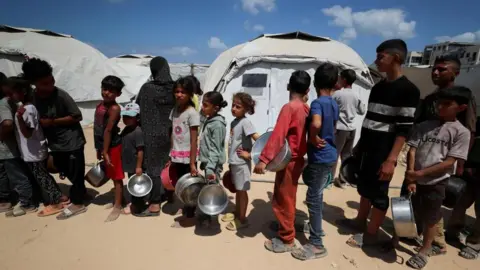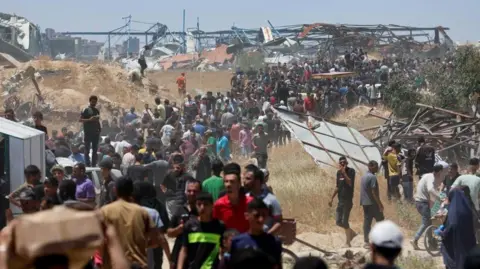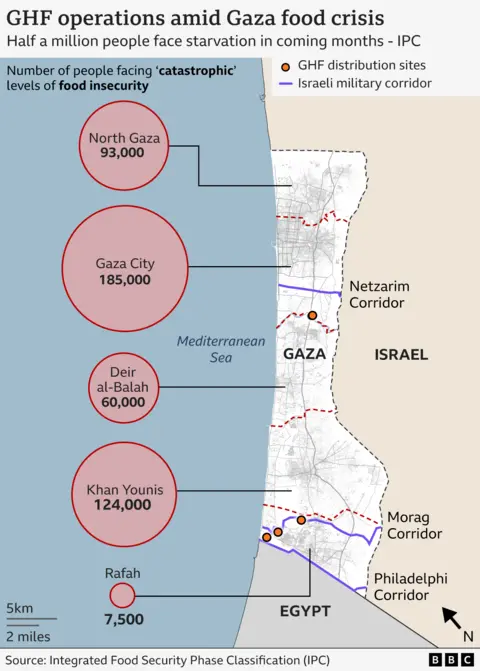Security breaks down in Gaza as desperate people search for food
 Reuters
ReutersThere is a state of chaos, a breakdown of security, and looting in north Gaza's main city, where Palestinians are desperately searching for food and where aid is difficult to access.
The Hamas-run interior ministry said seven of its police officers deployed to a market in Gaza City on Thursday were killed by an Israeli air strike as they attempted to restore order and confront what it called "looters".
The Israeli military has not commented on the incident, but it did say it had struck "dozens of terror targets" throughout Gaza over the past day.
Local medics and rescuers said at least 44 people were killed across the territory on Thursday, including 23 at the central Bureij refugee camp.
It comes a day after the UN's World Food programme (WFP) said at least two people were shot dead as what it described as "hordes of hungry people" broke into its warehouse in the central town of Deir al-Balah in search of food after 11 weeks of a total Israeli blockade. It was not clear who opened fire.
Almost 50 people were also reportedly shot and injured when thousands overran a new aid distribution centre run by the US and Israeli-backed Gaza Humanitarian Foundation (GHF) in the southern city of Rafah on Tuesday, according to a senior UN official in Gaza. The Israeli military said troops fired warning shots into the air but not at the crowds.
On Thursday, interior ministry police officers armed with Kalashnikov-style rifles and handguns went to a market near Gaza City's central al-Saraya junction, which houses a number of small stalls selling canned food and vegetables.
Videos circulating on social media, too graphic to share, show bodies, blood, and scattered remains lying on the ground following what the ministry said was an Israeli attack.
"Israeli occupation aircraft targeted a number of police officers... while they were performing their duty in confronting a group of looters earlier today, leading to the martyrdom of several officers and civilians in yet another massacre," a statement said.
The BBC requested comment from the Israeli military. It did not address the incident directly in its reply, saying that it was not provided with the "relevant coordinates and the specific time". It added that the IDF "follows international law and takes precautions to mitigate civilian harm".
There has been increased lawlessness in Gaza since Israel began targeting the Gaza interior ministry's police officers last year, citing their role in Hamas governance.
After the territory's police chief and his deputy were killed in a strike in January, the ministry insisted the force was a "civilian protection agency". The Israeli military accused the force of "violating human rights and suppressing dissent".
There were reports of a breakdown of order elsewhere in Gaza on Thursday, as desperate people searched for food and other supplies.
One witness who had gone to a GHF aid distribution centre near Rafah told the BBC that thousands of people had gathered in the area from dawn, and that they ended up breaking through the site's gate to try to obtain supplies.
At 08:00 local time, the witness said, the Israeli military issued a warning via a quadcopter drone instructing people to head to the distribution centre, and that they began moving in an orderly way towards the area.
"For exactly 10 minutes, things were organised but then the crowd broke through the gate and rushed into the courtyard."
"People grabbed boxes and sacks of flour and left, all under the surveillance of the Israeli quadcopter," they added.
Footage from near the GHF site shows thousands of Palestinians walking near the centre on Thursday morning. Some are in horse-drawn carts, while others wheel bicycles covered with goods.
Young men, for the most part, can be seen carrying sacks of flour on their heads and backs. One exhausted woman appears to struggle to walk among the crowd.
Abu Fawzi Faroukh, a 60-year-old Palestinian man who was at the site on Thursday morning, told AFP news agency that aid supplies were more difficult for the elderly and vulnerable to obtain.
"The young men are the ones who have received aid first, yesterday and today, because they are young and can carry loads. But the old people and women cannot enter due to the crowding."
"We have been humiliated, the Palestinian people are humiliated," he added.
People described similar scenes at the newly opened GHF distribution site in central Gaza, with a number telling the BBC they had come away empty-handed.
Umm Mohammed Abu Hajar said she had heard there was aid being distributed in the area, so took her ID and went to see what she could get.
"I found all the people hungry," she said. "So, I couldn't get anything. I left like this... empty-handed."
She said more organisation was needed in order to distribute aid "fairly", adding that currently, "some people eat and some people don't".
 Reuters
ReutersAnother man, Hani Abed, who was at the same distribution centre, said he'd failed to get any aid for him and his 10 family members.
"I came empty-handed and I left empty-handed," he said. "I will take dirt for my children to eat."
The GHF said approximately 17,280 food boxes, containing the equivalent of 997,920 meals, were handed out to Gazans at its three operational distribution sites on Thursday.
"Operations will continue scaling, with plans to build additional sites across Gaza, including in the northern region, in the weeks ahead," it added.
It also rejected the reports of Palestinians being shot at while trying to obtain aid at its centres. "No shots have ever been fired," it said.
The GHF's new aid system bypasses the UN and requires Palestinians to collect food parcels from distribution sites protected by US security contractors in areas controlled by the Israeli military in southern and central Gaza.
The UN has refused to co-operate with the system, saying it is unethical and unworkable.
The head of the UN's humanitarian office in Gaza, Jonathan Whittall, said on Wednesday that GHF could not possibly meet the needs of the 2.1 million population and was "essentially engineering scarcity".
The US and Israeli governments have said the new system is preventing aid from being stolen by Hamas, which the armed group denies doing.

Israel imposed a total blockade on humanitarian aid and commercial supplies to Gaza on 2 March and resumed its military offensive two weeks later, ending a two-month ceasefire with Hamas.
It said the steps put pressure on the armed group to release the 58 hostages still held in Gaza, at least 20 of whom are believed to be alive.
On 19 May, the Israeli military launched an expanded offensive that Prime Minister Benjamin Netanyahu said would "take control of all areas" of Gaza. The following day, he said Israel would also temporarily ease the blockade and allow a "basic" amount of food in.
The families of the remaining hostages have urged Netanyahu to agree a new ceasefire with Hamas to secure their release.
On Thursday, White House press secretary Karoline Leavitt said the Israeli government "supported" a new ceasefire proposal that was sent to Hamas by US special envoy Steve Witkoff.
"Israel signed off on this proposal before it was sent to Hamas," she said.
However, a senior Hamas official later told the BBC that the group rejected the proposal because it contradicted the discussions that it had with Witkoff.
The official said it did not include guarantees that the temporary ceasefire would lead to a permanent end to the fighting or that Israeli troops would withdraw to the positions they held before 2 March.
Israeli and US media cited Israeli officials as saying Witkoff's proposal included releasing 10 living hostages and the remains of dead hostages in two phases in exchange for a 60-day ceasefire and the release of a number of Palestinian prisoners in Israeli jails.
Israel launched a military campaign in Gaza in response Hamas' cross-border attack on 7 October 2023, in which about 1,200 people were killed and 251 others were taken hostage.
At least 54,249 people have been killed in Gaza since then, including 3,986 since Israel resumed its offensive, according to the territory's health ministry.
